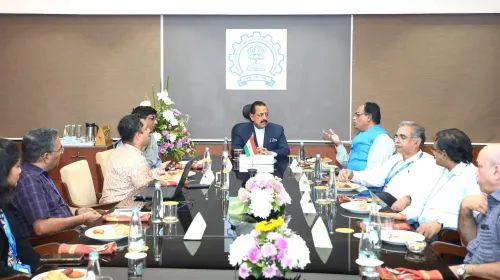Is Chinese Smuggling Disrupting Sri Lanka's Gem Industry?

Synopsis
Key Takeaways
- Chinese involvement in Sri Lanka’s gemstone trade is leading to severe economic losses.
- The Colombo High Court has taken significant legal actions against smugglers.
- Local traders are facing unfair competition from illicit operations.
- There is a notable loss of annual VAT revenue due to illegal transactions.
- The situation has broader implications for regional stability and economies.
New Delhi, Aug 15 (NationPress) The involvement of Chinese nationals in Sri Lanka's gemstone sector is leading to substantial financial losses for the nation, which is already grappling with a severe economic crisis, as reported by The Financial Post.
Allegations have surfaced that Chinese individuals have smuggled gems valued at around 30 billion rupees from Sri Lanka, undermining the country's tax revenues and endangering legitimate local businesses.
The article mentions that the Colombo High Court recently confiscated more than SLR 201 million from a Chinese businessperson linked to a prolonged smuggling and money laundering scheme.
Additionally, Sri Lanka Customs officials apprehended a Chinese national and his daughter at the Colombo airport with gemstones worth over SLR 17 million, which included Moonstones, Star Sapphires, and Emeralds, intended for illegal export.
Chinese visitors often enter Sri Lanka under the guise of tourism, subsequently acquiring precious gems from unlicensed intermediaries to avoid legal documentation and taxes. This activity results in enormous economic setbacks for Colombo's formal gem industry, draining resources meant for the local economy, the article indicates.
Estimates suggest that SLR 38 billion in annual Value Added Tax (VAT) revenue has been lost due to these informal and untaxed activities, adversely affecting Sri Lanka's economy on both domestic and international fronts.
The underground economy operates primarily on cash transactions to evade VAT and regulatory scrutiny.
Moreover, local communities suffer as traditional, regulated traders lose business opportunities.
This illicit parallel trade creates unfair competition for legitimate traders, leaving them at a disadvantage and worsening inequality in historical gem hubs like Ratnapura and Beruwala, the article highlights.
Furthermore, the gem market is facing a downturn in Western markets. Buyers from Europe and America are now turning to places like Thailand due to Colombo's damaged reputation. The parallel economy is also rife with money laundering through informal financial channels like hawala, which can be readily exploited.
The article draws parallels to China's operations in African nations, noting that $23 million worth of timber is being illegally exported to China from Mozambique. China's presence in nations like Congo, South Africa, and Nigeria has caused severe economic and environmental harm.
The Financial Post has identified this issue as a critical global concern, emphasizing the necessity to strengthen discussions around unsustainable extraction practices that rob fragile and developing economies of vital revenue. These unlawful payment channels are also exacerbating worries about regional conflicts, instability, and criminal networks in developing areas.









